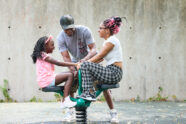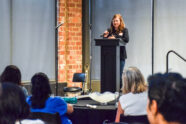Patient Stories
Every aspect of our work is driven by the people we care for. Our mission is to provide each patient the best care possible, and every day, we’re working to expand what’s possible.
Debra’s breast cancer story: Uplifting Black women with the opportunity to thrive
Cancer research, clinical care and prevention efforts address African-American patients’ needs
When Debra, who is Black, was diagnosed with breast cancer, she was treated at the Alvin J. Siteman Cancer Center — based at Barnes-Jewish Hospital and WashU Medicine. African American patients have a higher chance of dying from breast cancer, and a range of experts at Siteman are looking at all aspects of cancer prevention and care for Black patients — from understanding the disease’s molecular pathways to improving access to screening and care. Through moments of worry, Debra said her care team was always a positive force. She now sees herself as an ambassador for early detection among women who are suffering silently. “I did it,” she tells them; “you can do it too.” “It’s more than just survival,” Debra adds. “It’s about bringing all of us to a higher level so we can have the best opportunity to thrive.”
James’s diagnosis story: Finding answers after years of questions
Solving a medical mystery
Amy and Jason wanted to know why their son, James, was small and didn’t progress physically like others his age. After years of searching for an explanation, they finally found answers through the Undiagnosed Diseases Network at WashU Medicine. Funded by the National Institutes of Health (NIH), the Undiagnosed Diseases Network (UDN) brings together clinical and research experts from across the United States to collaborate on hard-to-diagnose conditions in patients of all ages. “It was just a relief — instant relief,” Amy says. “To get that news that you’ve been waiting seven years to hear — that someone has actually found something that they think is wrong with your child. It was an amazing phone call.”
Roger’s ALS story: Gaining hope in clinical trials
ALS Center provides access to innovative clinical trials
It started with weakness in his hands. And then — surprisingly quickly — his wrists, eventually spreading up his arms to his shoulders. Roger, a fitness buff, first attributed his loss of strength to aging. After he was diagnosed with amyotrophic lateral sclerosis (ALS), a debilitating neurodegenerative disorder, he decided to participate in a clinical trial at the WashU Medicine ALS Center. The study will help scientists deepen understanding of ALS to target new, more effective drugs, and even a cure. “I care,” says Roger. “And I want to help.”
Brandon’s story: Overcoming paralysis with nerve transfer surgery
Nerve transfer surgery gives hope to children with rare paralyzing illness
One Saturday when he was six, Brandon collapsed trying to get out of bed. His eventual diagnosis was a paralyzing illness called acute flaccid myelitis (AFM). WashU Medicine surgeon Amy Moore, MD, who specializes in restoring function in lower extremities, was able to transfer nerves from Brandon’s toes and abdomen to the injured nerves in his hip, restoring some function to his leg. “Before I wasn’t very stable,” Brandon says. “I had to use a walker to get around. But now thanks to the surgery, I’ve gotten stabilization and I’m able to play, have fun, be a normal eight year old.”
Chase’s transition story: Growing up transgender
Gender affirming care
In high school, Chase came out as transgender male — someone who is male but was assigned female at birth. Following years of all-encompassing care, working with the specialists at Washington University Transgender Center, Chase began the transition to align his body with his gender. The surgery culminated a long journey that began when Chase was very young. “I was so scared when I was coming out, about so many things,” he says. “I’m not scared anymore; I’m just … more whole.”
Noreen’s family’s story: Making decisions about the inherited risk of cancer
Genetic counseling helps families understand their options
After surviving breast cancer, Noreen was shocked, years later, by her pancreatic cancer diagnosis. Genetic testing at Siteman Cancer Center — based at Barnes-Jewish Hospital and WashU Medicine discovered a link between the two: an inherited BRCA 2 gene mutation. Members of Noreen’s family wondered if they might also have the mutation. The certified genetic counselors at Siteman Cancer Center helped Noreen and her family navigate decisions about testing their own cancer risk and preventive care.
Greg’s clinical trial story: Surviving sepsis
A new way to fight sepsis
Admitted to the Emergency Department with severe pain from pancreatitis and sepsis poisoning, Greg’s condition only grew more severe. After several weeks on a ventilator in the ICU, when Greg felt like giving up, he was enrolled in a study testing the ability of a drug called interleukin-7 (IL-7) to rev up the immune system and fight off sepsis. The approach goes against the grain of earlier strategies that have relied on antibiotics and inflammatory medications to tamp down the immune system. Patients in the study who received IL-7 experienced a threefold to fourfold increase in two key types of immune cells. “If they wouldn’t have approached us with the trial,” says Greg’s mother, “I really don’t think Greg would be here.”
Barbara’s clinical study story: Learning from a family history of Alzheimer’s
Alzheimer’s study aims to predict who will develop the disease
Barbara is participating in a long-term study of adult children who have a parent diagnosed with Alzheimer’s. Led by WashU Medicine, the study aims to define who is likely to develop the disease and when, and to establish a timeline for how quickly the disease will progress.






 Mobilizing the best to start the fight earlier
Mobilizing the best to start the fight earlier  Podcast: Making connections through storytelling
Podcast: Making connections through storytelling